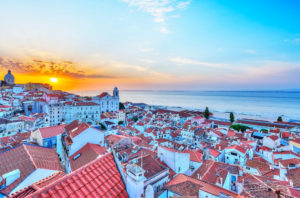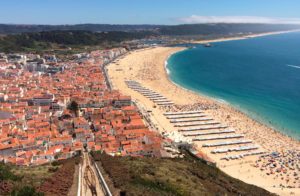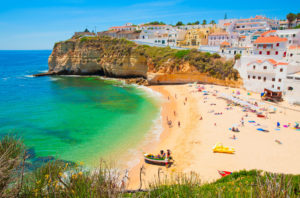Retire In Portugal: An Affordable Retirement In Europe
Are you looking for a house in Portugal or an apartment for a retreat in the sun?
Let’s talk about your projectAre you looking for a house in Portugal or an apartment for a retreat in the sun?
Let’s talk about your projectSince January 2013, all foreign retirees who live at least 183 days in Portugal or who, on the 31st of December, have accommodation in Portugal that they intend to use and occupy as their main residence will be exempt from Tax on their foreign sourced individual Income for a period of 10 years.
This exemption may be combined with the other exemptions applicable to “non-habitual” Portuguese residents already in place, which provides an exemption on income earned abroad. This non-habitual residence regime has another advantage: a flat rate tax of only 20% tax applies on revenues from the provision of services and salaries received in Portugal. Dividends, interest, capital gains and any other foreign-sourced income will be exempt from Income Tax for individuals.
To benefit from this measure, you must not have been taxed as a fiscal resident in Portugal in the last 5 years and must prove that you have an accommodation in Portugal that you use as your main residence.
Enjoy your retirement in the Sun. Invest in Portugal!
No Income Tax On Pension Income For 10 Years!
Tagus Property
The memorandum issued on 3 August 2012 aiming to facilitate the recognition of the status of NHR in Portugal has now been implemented. It should encourage foreigners to settle in Portugal as owners or tenants. Indeed, in Portugal foreign pensions received by tax residents are exempt from income tax since the 1st of January 2013.
Moreover, the European Union tax agreement assigns the exclusive right to tax private pensions in the Country of residence. Therefore, if an individual moves to Portugal and lives there more than 183 days and has not been a tax resident there in the previous five years, he/she can benefit from the Portuguese non-habitual resident* status. Subject to the residency being undisputed, private pensions are therefore not taxable in the individual’s own country and are also tax-free in Portugal.
This results in a double exemption for private pensions!
* Please note that the registration as a non-habitual resident has been simplified by the memorandum from 3 August 2012. This registration now only requires a simple declaration from the taxpayer confirming that they have not been a Portuguese tax resident over the last five years.
The non-habitual resident regime (NHR) can apply to natural persons transferring their tax residence to the Portuguese territory, if they have not been a tax resident in Portugal any time during the 5 years preceding the transfer.
As part of the NHR regime, most of the revenues from foreign sources are not taxable in Portugal. In addition, the income generated in Portugal from activities considered as added value can benefit from a fixed tax rate of 20%.
Duration of the NHR regime
Once registered with the register of taxpayers at the department of finance (Autoridade tributária or AT), taxpayers in these circumstances obtain the right to be taxed as NHR for a duration of 10 consecutive years, if they are considered to be tax resident in Portugal each year of the period in question. At the end of this 10-year period, they will revert to taxation under general rules.
There is no “renewal” procedure for the NHR regime, so it remains in place until the department of finance (AT) refuses to apply it.
Tax residency in Portugal can be acquired at any time once a person meets one of the following requirements:
To be taxable as NHR each year during the 10-year period, it is necessary for the taxpayer to be considered as resident for the purposes of the IRS. If the taxpayer cannot benefit from the NHR taxation right at any stage during the 10 years, he can benefit from it again for any remaining year in the period, provided he is again considered as a resident for purposes of the IRS.
Please note that these requirements were changed on January 1, 2015.
The NHR registration request must be submitted after the registration as Portuguese fiscal resident and until and including the 31st of March of the following year.
The NHR regime provides two sets of benefits depending on the source (national or foreign) and the nature of the income received.
Generally, these benefits are as follows:
Interest, dividends and other income from capital, capital gains, income from salaries and from self-employment, income from property and income from state or private pensions;
Capital gains from the sale of shares are generally not exempt.
Income from salaries and self-employment.
Foreign-source income received by the NHR and listed below are exempt, subject to compliance to the following requirements:
French, British, Scandinavian citizens among others are eligible for this regime.
Order No. 12/2010 from June 7th 2010 defines the activities considered as high added value, including:
Examples:
Here are a couple of examples of situations we are regularly approached for:
João, Brazilian citizen, applies for the NHR status.
His income from Brazil as taxed as follows:
* In 2017, this additional tax varies between 0 and 3.21%, depending on the range of the taxable income.
Whatever the case may be, the resident will be liable to pay contributions to social security, at the rate normally applicable in Portugal, except in exceptional situations.
Jean, a French national, applies for the RNH status.
His French income will be taxed in Portugal as follows:
Whatever the case may be, the resident will be liable to pay contributions to social security, at the rate normally applicable in Portugal, except in exceptional situations.
* An additional tax may apply. The rate varies between 0 and 3.21% in 2017, depending on the range of the taxable income.
Latest developments
The NHR – Non-Habitual Residency Programme, and its application to UK nationals, should be unaffected by Brexit due to the fact that the domestic NHR legislation is complemented by the bilateral tax agreement that Portugal has signed with a series of countries, including the UK (double taxation agreement between Portugal and the uk, 1968).However what will be affected in a no deal scenario is the residency rights of British citizens as third country nationals. Clearly the position of uk nationals who will be resident in Portugal prior to 29th march 2019 and those who wish to become resident in Portugal after 29th march 2019 will be determined by the deal which the UK is able to negotiate with the eu. In circumstances where there is no deal, which is at least a possibility at this stage, then those uk nationals who has already established residency rights in Portugal would be in a stronger position.
This is due to the fact that these rights should be guaranteed according to the agreement reached between the UK and the eu on rights granted after the triggering of article 50 and 29th march 2019, together with the latest guarantees issued by the Portuguese government.
From the date of the referendum result, the Portuguese authorities, including the Portuguese prime minister António Costa, have consistently spoken of guaranteeing the rights of uk nationals living in Portugal, provided that there is reciprocity. In addition, the Portuguese institutions are strongly encouraging all uk nationals living in Portugal to register themselves properly with the local authorities. Whilst there are no absolute guarantees until legislation is published, there are very positive signs that uk nationals currently registered as resident in Portugal will continue to be able to exercise those rights freely after 29th march.
These signs include the exemption of British citizens from holding a visa and the guarantee stated in the British government white paper of 6th December 2018 that eu citizens resident in the uk by 29th march 2019 will be able to stay.
As a result, for those UK nationals interested in applying for the NHR programme in 2019, consideration should be given to establishing residency rights in Portugal prior to 29th march 2019.
The portuguese non-habitual residency status enables those who become tax resident in portugal, and are accepted as NHR, the opportunity to receive qualifying income tax free both in portugal and in the country of source of the income.
Tagus Property

Contact our property finders in the Lisbon region to discuss your real estate project.
Read more
Use a hunter to find a house or apartment around Lisbon region.
Read more
Contact a property hunter to find your villa in the Algarve or your apartment by the sea in Portugal.
Read more